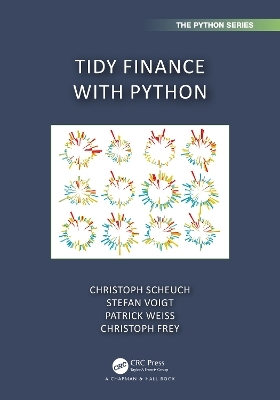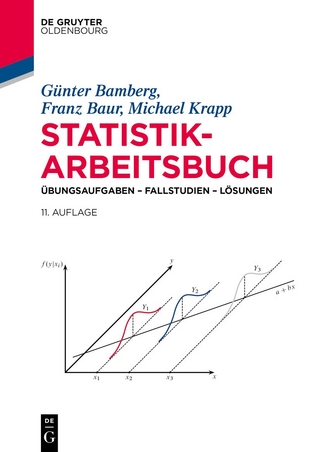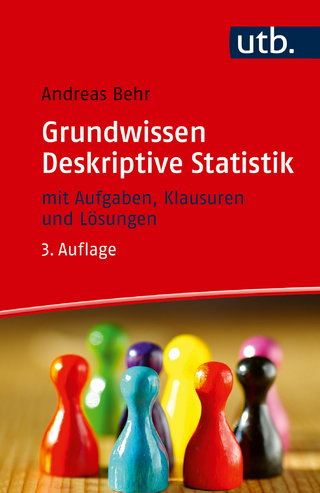
Tidy Finance with Python
Chapman & Hall/CRC (Verlag)
978-1-032-67641-8 (ISBN)
Key Features:
Self-contained chapters on the most important applications and methodologies in finance, which can easily be used for the reader’s research or as a reference for courses on empirical finance.
Each chapter is reproducible in the sense that the reader can replicate every single figure, table, or number by simply copying and pasting the code we provide.
A full-fledged introduction to machine learning with scikit-learn based on tidy principles to show how factor selection and option pricing can benefit from Machine Learning methods.
We show how to retrieve and prepare the most important datasets financial economics: CRSP and Compustat, including detailed explanations of the most relevant data characteristics.
Each chapter provides exercises based on established lectures and classes which are designed to help students to dig deeper. The exercises can be used for self-studying or as a source of inspiration for teaching exercises.
Christoph Frey is a Quantitative Researcher and Portfolio Manager at a family office in Hamburg and a Research Fellow at the Centre for Financial Econometrics, Asset Markets and Macroeconomic Policy at Lancaster University. Prior to this, he was the leading quantitative researcher for systematic multi-asset strategies at Berenberg Bank and worked as an Assistant Professor at the Erasmus Universiteit Rotterdam. Christoph published research on Bayesian Econometrics and specializes in financial econometrics and portfolio optimization problems. Christoph Scheuch is the Head of Artificial Intelligence at the social trading platform wikifolio.com. He is responsible for researching, designing, and prototyping of cutting-edge AI-driven products using R and Python. Before his focus on AI, he was responsible for product management and business intelligence at wikifolio.com and an external lecturer at the Vienna University of Economics and Business, where he taught finance students how to manage empirical projects. Stefan Voigt is an Assistant Professor of Finance at the Department of Economics at the University in Copenhagen and a research fellow at the Danish Finance Institute. His research focuses on blockchain technology, high-frequency trading, and financial econometrics. Stefan's research has been published in the leading finance and econometrics journals and he received the Danish Finance Institute Teaching Award 2022 for his courses for students and practitioners on empirical finance based on Tidy Finance. Patrick Weiss is an Assistant Professor of Finance at Reykjavik University and an external lecturer at the Vienna University of Economics and Business. His research activity centers around the intersection of empirical asset pricing and corporate finance, with his research appearing in leading journals in financial economics. Patrick is especially passionate about empirical asset pricing and strives to understand the impact of methodological uncertainty on research outcomes.
Preface
Author Biographies
Part 1: Getting Started
1. Setting Up Your Environment
2. Introduction to Tidy Finance
Part 2: Financial Data
3. Accessing and Managing Financial Data
4. WRDS, CRSP, and Compustat
5. TRACE and FISD
6. Other Data Providers
Part 3: Asset Pricing
7. Beta Estimation
8. Univariate Portfolio Sorts
9. Size Sorts and p-Hacking
10. Value and Bivariate Sorts
11. Replicating Fama and French Factors
12. Fama-MacBeth Regressions
Part 4: Modeling and Machine Learning
13. Fixed Effects and Clustered Standard Errors
14. Difference in Differences
15. Factor Selection via Machine Learning
16. Option Pricing via Machine Learning
Part 5: Portfolio Optimization
17. Parametric Portfolio Policies
18. Constrained Optimization and Backtesting
Appendices
A. Colophon
B. Proofs
C. WRDS Dummy Data
D. Clean Enhanced TRACE with Python
E. Cover Image
Bibliography
Index
| Erscheinungsdatum | 09.07.2024 |
|---|---|
| Reihe/Serie | Chapman & Hall/CRC The Python Series |
| Zusatzinfo | 33 Line drawings, black and white; 33 Illustrations, black and white |
| Sprache | englisch |
| Maße | 178 x 254 mm |
| Gewicht | 453 g |
| Themenwelt | Mathematik / Informatik ► Mathematik |
| Wirtschaft ► Betriebswirtschaft / Management | |
| Wirtschaft ► Volkswirtschaftslehre ► Ökonometrie | |
| ISBN-10 | 1-032-67641-8 / 1032676418 |
| ISBN-13 | 978-1-032-67641-8 / 9781032676418 |
| Zustand | Neuware |
| Haben Sie eine Frage zum Produkt? |
aus dem Bereich


